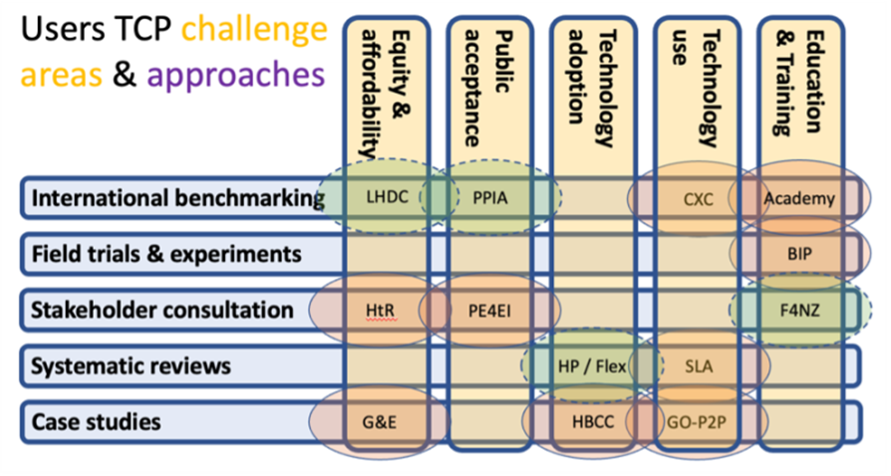User-Centred Energy Systems (UsersTCP)
Short Description
The UsersTCP (User-Centred Energy Systems Technology Collaboration Programme) is an international research and cooperation programme run by the International Energy Agency (IEA) that has been investigating socio-technical aspects of the energy transition since 2019 (previously known as the IEA DSM TCP). The aim is to provide politically relevant evidence on how people use energy, accept technologies and participate in the transformation. At its core is the recognition that the energy transition must be shaped not only technically, but also socially. To this end, UsersTCP brings together international expertise in various areas of work, such as hard-to-reach user groups, social justice and gender issues, acceptance of automation, peer-to-peer energy trading and user-oriented buildings. Members include Austria, Belgium, Canada, Finland, Ireland, Italy, Korea, the Netherlands, New Zealand, Norway, Sweden, Switzerland, the United Kingdom and the United States (Australia has since withdrawn). With this broad base and a strategy running until 2030, the programme promotes exchange between science, politics and practice in order to develop user-centred solutions, strengthen social acceptance and create fair framework conditions for clean energy systems worldwide.
The activities in the current strategy period of the Users TCP can be divided into four main areas:
- Fairness and affordability: Analysis of how the energy transition affects different population groups, with a focus on hard-to-reach users, disadvantaged households and gender equality issues in energy policy.
- Public acceptance: Investigation of the factors that shape understanding and acceptance of energy policy and infrastructure, including guidelines for information campaigns and participation processes.
- Promotion of climate-friendly technologies (both acceptance of use and technology introduction): Research into how people accept, trust and make optimal use of new, low-carbon technologies (e.g. automation, local energy markets, climate-fit buildings, flexible appliances and heat pumps).
- Education and training: Development of knowledge platforms and tools to strengthen skills for a climate-friendly energy future – from behavioural knowledge in policy-making to support for companies in net-zero strategies.
The pillars are shown in the following graphic, with the rows representing the methods that are mostly used. The circles represent ongoing (orange) and future (green) tasks. More detailed information can be found on the TCPs user homepage.
Ongoing Tasks/Annexes
- Social License to Automate (Phase 3: 2025-2027)
- Empowering all: Gender in policy and implementation for achieving transitions to sustainable energy (Working period 2024-2026)
- Public engagement to energy infrastructure (Phase 2: 2025-2026; Phase 2 focuses on hydrogen, carbon capture, utilisation and storage (CCUS) and new nuclear technologies)
Completed Tasks
- IEA UsersTCP Annex "Empowering all": Gender in policy and implementation for achieving transitions to sustainable energy
Working period 2022-2024
Working period 2020-2022 - IEA UsersTCP Annex "Social License to Automate"
Working period 2022-2024
Working period 2019-2021 - IEA-DSM Task 9: The Role of Municipalities and Energy Efficiency in a Liberalised System
- IEA-DSM Task 10: Performance Contracting
- IEA-DSM Task 16: Competitive Energy Services (Energie-Contracting, ESCo Services): working period 2013-2015
- IEA-DSM Task 17: Integration of DSM, distributed power generation, renewable energy sources and electrical energy storage: working period 2013-2016 (phase 3)
- IEA-DSM Task 24: Behaviour Change in DSM, From Theory to Policies and Practice: working period 2015-2017
- IEA-DSM Task 25: Business Models for a More Effective Market Uptake of Efficient Energy Services: working period 2015-2017
Participants
Austria, Belgium, Canada, Finland, Ireland, Italy, South Korea, Netherlands, New Zealand, Norway, Sweden, Switzerland, United Kingdom, United States
Contact Address
Exco representative
Tara Esterl
AIT Austrian Institute of Technology
Giefinggasse 6, 1210 Wien
E-Mail: tara.esterl@ait.ac.at
Exco alternate
Mag. Sabine Mitter
Austrian Federal Ministry of Innovation, Mobility and Infrastructure
Tel.: +43 (1) 711 62 - 652915
E-Mail: sabine.mitter@bmimi.gv.at

